Americans’ dissatisfaction with politics extends to their views of presidential campaigns, both present and past. Only about a third (35%) say they are satisfied with the people who will be running for president next year.
Looking back at recent presidential campaigns, sizable majorities say they were not informative, too long and not focused on the right issues. Nearly eight-in-ten Americans (78%) say recent campaigns did not feature party nominees who were good candidates.
Most Americans say who the president is makes a big difference for such areas as the U.S. standing in the world and the mood of the country. Far fewer say who is president makes a big difference to their personal life.
Large shares of both Republicans and Democrats say the president should focus at least a fair amount on the priorities of people who voted for them. Smaller majorities say they should focus on the interests of people who did not vote for them. Republicans are less likely than Democrats to say the president should focus on the priorities of people who did not vote at all.
Impressions of the people who will be running for president in 2024
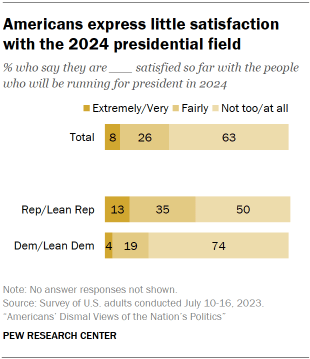
Most Americans (63%) say they are not too or not at all satisfied when thinking about the people who will be running for president in 2024. In the survey, conducted in mid-July, about a quarter (26%) say they are fairly satisfied. Just 8% are extremely or very satisfied.
While there is widespread dissatisfaction in both party coalitions, Republicans are somewhat more satisfied than Democrats. Among Democrats and Democratic-leaning independents, just 24% are at least fairly satisfied (with only 4% reporting they are extremely or very satisfied). Among Republicans and Republican leaners, about half (48%) are at least fairly satisfied (including 13% who are extremely or very satisfied).
Views about presidential campaigns
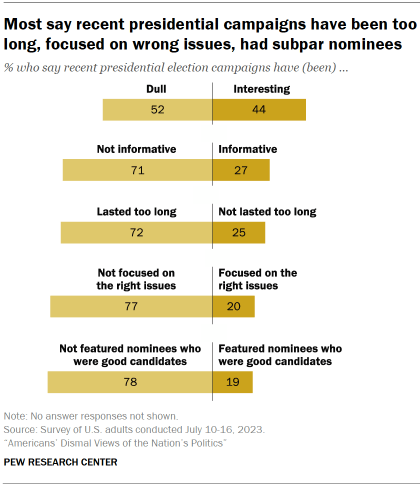
Americans are critical of recent presidential campaigns in negative ways, with seven-in-ten or more saying they haven’t been informative (71%), have focused on the wrong issues (77%), have lasted too long (72%) and haven’t featured nominees who were good candidates (78%).
Americans are more evenly split over whether campaigns have been interesting or dull, although they are still more negative than positive. About half (52%) say recent presidential campaigns have been dull, while 44% say they have been interesting.
Partisan and engagement differences on recent presidential campaigns
There are relatively modest partisan gaps in views of whether presidential campaigns are interesting, informative, go on too long, focus on the right issues or result in good nominees. But in both partisan coalitions, there are some notable differences between more and less politically engaged people.
Dull or interesting?
People who are less politically engaged are considerably more likely to say recent political campaigns have been dull, rather than interesting. And this holds among both Republicans and Democrats. More than six-in-ten (64%) less politically engaged people say campaigns have been dull, but that falls to about four-in-ten among people who are highly politically engaged.
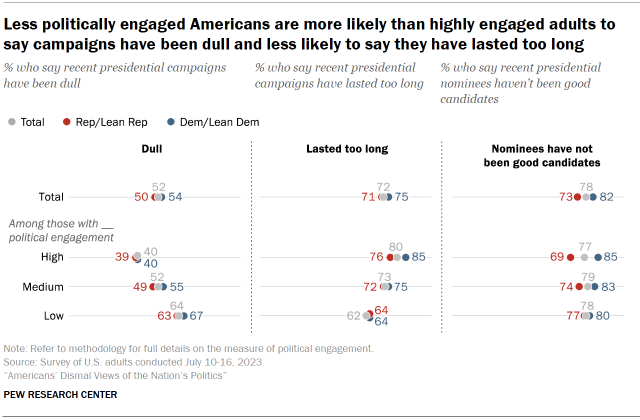
Are too long or not too long?
People with higher levels of political engagement are particularly likely to say presidential elections go on too long. Though majorities of those at all levels of political engagement say this, 80% of high-engagement people hold this view (including 76% of high-engagement Republicans and 85% of high-engagement Democrats), this drops to about six-in-ten (62%) among people with low levels of political engagement.
Have the nominees been good candidates?
Although clear majorities also say recent presidential nominees have not been good candidates, Democrats overall are somewhat more likely than Republicans to say this (82% vs. 73%). The partisan gap is somewhat wider among more engaged Americans: 85% of highly engaged Democrats and 69% of highly engaged Republicans say recent presidential elections have not yielded good candidates.
How much of an impact does who is president have on your life?
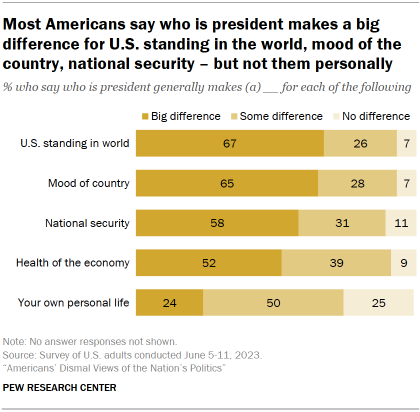
Today, 67% of adults say who is president makes a big difference for the United States’ standing in the world, with clear majorities saying the same for the mood of the country (65%) and national security (58%).
Roughly half of Americans (52%) also say who is president makes a big difference for the health of the economy.
By comparison, far fewer Americans say who is president makes a big difference in their personal lives. About a quarter (24%) say this (though half say this makes some difference).
Whose priorities should the president focus on?
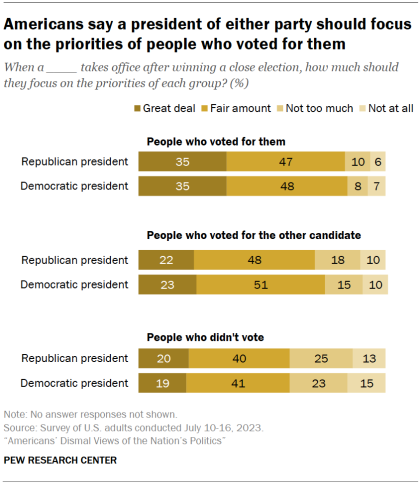
Regardless of whether the winner of a close presidential election is a Democrat or Republican, Americans overwhelmingly say the president should focus on the priorities of the people who voted for them. But sizable shares also say the president should focus on the priorities of those who voted for the president’s opponent and the concerns of those who didn’t vote.
About eight-in-ten adults say a president of either party who takes office after a close election should focus at least a fair amount on the priorities of those who voted for them, with nearly identical shares saying this about a Republican president who wins narrowly (82%) and a Democratic president who wins narrowly (83%). Roughly a third say this group should receive a great deal of focus from a president of either party.
Clear majorities of Americans also say a newly elected Republican (70%) or Democratic (73%) president should focus on the priorities of the people who voted for the other candidate. However, the public is less likely to say that the president should focus a great deal on this group’s priorities (22% for a Republican president, 23% for a Democratic president).
Americans are less likely to say a new president should focus on the priorities of the people who didn’t vote. Still, six-in-ten say a president of either party should focus at least a fair amount on this group’s priorities.
Partisan views of presidential winners
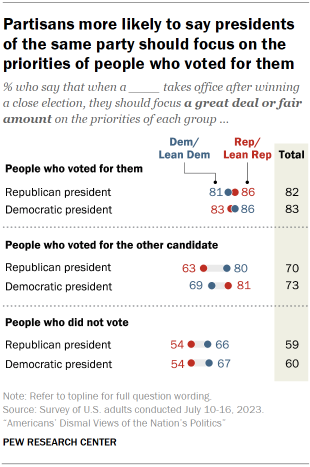
Democrats and Republicans alike overwhelmingly say that presidents should focus a great deal or fair amount on the priorities of the people who voted for them following a close election.
Those who identify with or lean to each party are slightly more likely to say this when asked about a presidential winner of their party (86% each). Still, at least eight-in-ten say that a winning president should focus on the priorities of their voters – even when the president they are being asked about is a member of the opposing party.
But when asked about the priorities of people who voted for the losing candidate, both Democrats and Republicans are more likely to think the losing side’s concerns should matter when the losers are in their partisan coalition.
For instance, 80% of Democrats and Democratic leaners say a Republican president should listen at least a fair amount to the people who voted for that president’s Democratic opponent. But a smaller share (69%) of Democrats say a Democratic victor should listen to people who voted for that president’s Republican opponent.
The pattern is nearly the same among Republicans: When asked about a Democratic president, 81% of Republicans say the president should listen to those who voted for the Republican, while 63% say a GOP president should listen to Democratic voters.
Democrats are more likely than Republicans to say a president should focus on the concerns of people who did not vote – and this is the case when asked about both Democratic and Republican winners. About two-thirds of Democrats, compared with 54% of Republicans, say this in both scenarios.




